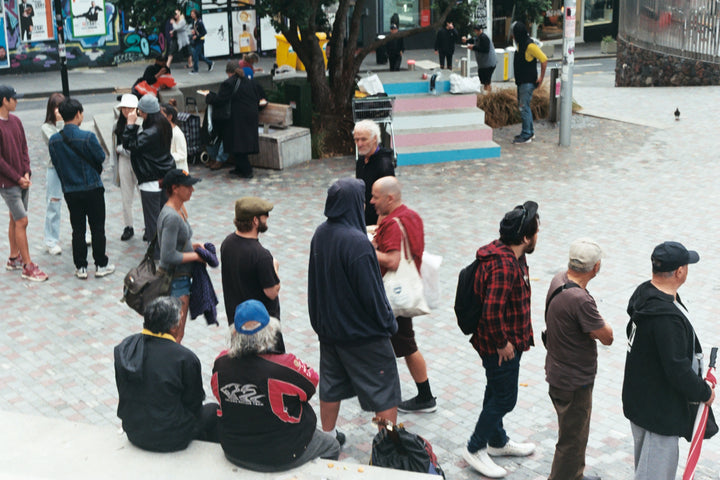
Clothes are not trash because they are - like housing, a human right.
by Charli Cox
·
In the beginning, Koha Apparel wasn’t necessarily trying to get into sustainability; there was just this need to clothe people. People on the streets, you know, that you see, constantly. This was back in 2019 and things have gotten a whole lot worse. Over the past three years we have seen politics become more and more negligent—and the last two years of the Pandemic has really pulled this into focus. And while many have profited from our current system and some of us are doing alight, some people are not.
What it looks like when we care a little bit
In a time of high child poverty and economic inequality, we’re also, now facing complex social and economic issues. We’ve seen money printing and handouts to corporates while individuals were pushed into emergency housing, and people waited in line for food parcels. What I have seen is a lot of people do the work the government should be doing. As a result, communities have had to come together to support those in need, where social care cannot stretch or often to reach those who slip through the cracks in our system.
Doing the work
We work alongside some incredible people and organisations bringing about change, providing the services that they don’t see the government enacting. Organisations such as Orange Sky, Feed the Homeless Auckland, Everybody Eats and Sunday Blessings. Currently, we provide support across fifteen locations throughout Tāmaki Makaurau and more recently we started showing up at Central Park Apartments in Wellington, a location which is part emergency housing, part student accommodation. There’s a lot more people today struggling to make ends meet.
We’ve managed to amass a staggering volume of clothes
Having the clothing you need shouldn’t be a luxury, yet clothing poverty remains an issue as increaesibly households experience material hardship, faced with choosing whether to pay a utility bill or buy groceries. “Make do and mend”, or so the saying goes, is the reality of many. People with limited resources are not shopping at fast fashion chains, sharing their hauls on TikTok. So while we might not think it, being able to make choices around what we eat, what we wear—we must also recognising it is a privilege to be able to do so.
It is the incomprehensible pace in which clothing is being produced. How it is produced. Fast fashion is a human rights issue. We are utterly disconnected from the manufacturing process. Everyone’s brainwashed and unaware of the brands withholding payment from factories, the garment workers underpaid and abused. We’re exploiting people to stay on trend.
Reducing pace and rethinking our systems
Consumerism has been marketed to us as a way of life. That your life could be better, you could be more attractive if you bought this and that. It is hard to change culture, our way of thinking – but we must. It’s true that we play an important role in shaping fashion, that we, the market forces drive trends and innovation—but we need the industry to act and address the systemic issues that persist. They created the issues, the pollution, the waste, the exploitative labour practices and so are uniquely placed to solve these issues. That said, if we are in a position to make choices around fashion, then we can also choose what systems we buy into.
By helping one another, we’ll help our community, and maybe our country
At times it can be pretty overwhelming, the scale of what is happening in the world. We are, as are many others, focused on what we can do here. We aim to drive change through culture, working alongside many other diverse communities and organisations, together with volunteers—people who care about their communities. And there are many ways to get involved, whether that is sharing our social media posts, amplifying our message, or donating clothing. Everything is encouraging collective action.
This month, we passively participate in Second Hand September, that we empowering re-use culture, and encourage people to question their relationship with consumerism every month. Not just September.
Also, we are pleased to announce that after a 6 month hiatus, we will begin accepting clothing donations as of October, 1. We encourage you to drop-off any clothing that is no longer useful to you, to our Mount Albert Hub. You can read our donation criteria here. And if you would like to organise a collection at your workspace, please email Charli for more details. Together, we’re all invested in creating positive change how we can.